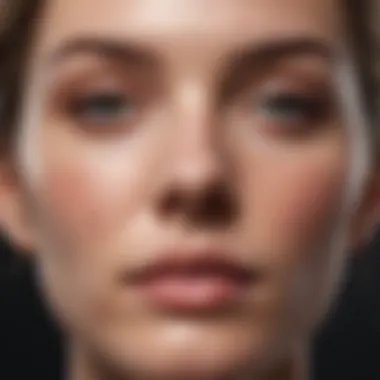Expert Tips for Treating Head Acne Effectively - A Comprehensive Guide


Beauty Tips and Tricks
When it comes to dealing with acne on the head, implementing effective skincare routines is paramount. Proper cleansing and exfoliation can help prevent breakouts. Consistency is key in maintaining clear skin. Sometimes, simple changes like using a gentle shampoo or avoiding certain hair products can make a significant difference. Additionally, staying hydrated and eating a balanced diet can promote overall skin health.
Skincare Routine Tips
Maintaining a consistent skincare routine tailored to head acne is crucial. Use a gentle cleanser with salicylic acid to help unclog pores. A dermatologist-recommended sunscreen is essential to protect the skin from harmful UV rays. Incorporating a lightweight moisturizer can help balance oil production.
Haircare Hacks
Haircare plays a significant role in managing head acne. Opt for sulfate-free shampoos and conditioners to avoid irritation. Regular scalp massages can improve blood circulation and promote a healthy scalp environment. Avoiding tight hairstyles that pull on the scalp can help prevent breakouts.
Expert Beauty Advice
Seeking advice from skincare specialists and dermatologists can offer personalized solutions for head acne. Professional insights can help pinpoint specific triggers and recommend suitable treatments. Following expert recommendations regarding skincare products and treatments is essential for long-term skin health.
Beauty Industry News
Staying updated on product launches, beauty events, and celebrity beauty collaborations can provide valuable insights into the latest trends and innovations in the beauty industry. Following beauty influencers and industry experts on social media platforms can offer real-time updates on skincare and makeup trends.
Understanding Head Acne
In this comprehensive guide on dealing with acne specifically on the head, the section 'Understanding Head Acne' plays a crucial role. Understanding the nuances of head acne is pivotal for effective management and treatment. By exploring the intricacies of head acne, readers gain valuable insights into the triggers, symptoms, and underlying causes that contribute to this skin concern.
What is Head Acne?
Head acne, also known as 'scalp acne,' is a skin condition characterized by the presence of acne lesions on the scalp. These lesions can manifest as blackheads, whiteheads, papules, or pustules. Head acne often presents unique challenges compared to facial or body acne, as the scalp has distinct features that require tailored care and treatment.
The hair follicles on the scalp can become clogged with excess oil (sebum), dead skin cells, and bacteria, leading to the development of acne. Factors such as hormonal imbalances, genetic predisposition, poor scalp hygiene, and certain medications can contribute to the formation of head acne.
Common Causes of Head Acne
Head acne can stem from various factors, including:


- Excess Sebum Production: Overactive sebaceous glands can result in oily scalp conditions conducive to acne development.
- Clogged Hair Follicles: Accumulation of oil, dead skin cells, and impurities can block hair follicles, triggering acne outbreaks.
- Bacterial Infections: Proliferation of acne-causing bacteria, such as Propionibacterium acnes, on the scalp can lead to inflammatory acne lesions.
- Hormonal Fluctuations: Hormonal changes, especially during puberty, menstrual cycles, or stress periods, can influence sebum production and exacerbate head acne.
Factors Contributing to Head Acne
Several factors contribute to the onset and persistence of head acne, including:
- Hair Care Products: The use of comedogenic or pore-clogging hair products can aggravate scalp acne.
- Environmental Factors: Exposure to pollutants, humidity, and UV radiation can impact scalp health and exacerbate acne.
- Dietary Choices: Consuming high-sugar, high-dairy, or processed foods may trigger inflammation and worsen acne symptoms.
- Stress Levels: Elevated stress levels can disrupt hormonal balance and contribute to increased sebum production, leading to head acne concerns.
By delving into the specific details of head acne causes and contributing factors, individuals can better understand the mechanisms underlying this skin issue and make informed decisions regarding prevention and treatment strategies.
Prevention Techniques
In the realm of combating head acne, prevention techniques emerge as crucial pillars anchoring effective management strategies. This segment compellingly navigates the nuances of preventive measures tailored to thwart head acne’s onset and progression. By dissecting common causes and risk factors triggering head acne eruptions, readers unearth actionable insights to fortify their skincare regimens against advancing breakouts. Through a meticulous unveiling of preventative methodologies, this guide primes individuals to fortify their battleground against head acne infiltrations, fostering skin resilience. Embrace prevention techniques as your shield against stubborn head acne.
Healthy Hair Habits
-#### Choosing the Right Hair Products
Choosing the right hair products materializes as a pivotal step in curating a balanced skincare regimen aimed at halting head acne resurgence. An in-depth exploration of hair product selection sheds light on the symbiotic relationship between product efficacy and skin compatibility. Delve into the essence of opting for non-comedogenic formulations to avert pore-clogging conundrums, steering clear of acne exacerbation. Safeguard your scalp with meticulously chosen hair products, enhancing dermatological harmony.
-#### Maintaining Scalp Hygiene
Elevating scalp hygiene from a routine chore to a skincare essential unfurls a pathway studded with skin-clearing benefits. Unveil the sanctity of scalp hygiene in forestalling sebum buildup and bacterial proliferation, core factors underpinning head acne manifestations. Embrace gentle cleansing rituals as scalp skin's nurturing touchstone, mitigating inflammation triggers and oiliness. Pioneer cleanliness as your ally in the battle against head acne invasions.
Balanced Diet for Skin Health
-#### Impact of Diet on Skin Condition
The profound impact of dietary choices on skin vitality stands as a focal juncture in dictating head acne's prevalence and persistence. Voyage through the labyrinth of dietary repercussions on skin health, demystifying the interplay between nutrient intake and skin resilience. Grasp the essence of nourishing your way to radiant skin by deciphering the pivotal role of diet in mitigating inflammatory responses fueling acne flare-ups. Empower your skin from within through mindful dietary selections destining towards acne alleviation.
-#### Foods to Include and Avoid
Navigating the culinary landscape to unearth skin-friendly dietary allies and foes becomes pivotal in sculpting a menu poised for acne abatement. Engage in a discerning discourse on the foods' dichotomy, deciphering the inflammatory potential lurking within dietary staples. Embark on a dietary overhaul journey, prioritizing skin-friendly victuals while conscientiously circumventing acne-triggering culinary culprits. Craft your dietary canvas meticulously, painting a portrait of skin-nourishing gastronomic excellence.


Skincare Routine for Head Acne
Acne on the head can be a persistent issue requiring a dedicated skincare routine. This section of the ultimate guide dives into the essential practices for effectively managing head acne. By understanding the importance of a targeted skincare regimen, individuals can take proactive steps to improve their skin health and reduce acne breakouts.
Choosing Suitable Skincare Products
When it comes to addressing head acne, selecting the right skincare products is paramount. Two key aspects to consider are non-comedogenic formulations and incorporating acne-fighting ingredients. Let's explore these elements in detail.
Non-Comedogenic Formulations
Non-comedogenic products are designed to prevent pore clogging, which is crucial for acne-prone skin. Their lightweight consistency allows the skin to breathe, reducing the likelihood of breakouts. Opting for non-comedogenic formulations ensures that your pores remain unclogged, promoting clearer and healthier skin.
In this article, non-comedogenic products are highlighted for their gentle yet effective nature. Their ability to keep the skin clear without causing congestion makes them a popular choice for individuals dealing with head acne. While some may find non-comedogenic products to be slightly pricier, their benefits in maintaining skin clarity are well worth the investment.
Incorporating Acne-Fighting Ingredients
Choosing products enriched with acne-fighting ingredients can provide targeted treatment for head acne. Ingredients like benzoyl peroxide and salicylic acid are known for their ability to combat acne-causing bacteria and reduce inflammation. By incorporating such ingredients into your skincare routine, you can actively address existing acne issues and prevent future breakouts.
In this guide, the incorporation of acne-fighting ingredients is emphasized for their efficacy in tackling head acne concerns. The unique feature of these ingredients lies in their targeted approach, specifically addressing acne-related issues. While their potency may cause slight dryness or redness initially, the long-term benefits they offer in combating acne make them indispensable in an acne-focused skincare routine.
Effective Cleansing Techniques
Proper cleansing techniques play a vital role in managing head acne by keeping the scalp clean and free from impurities. This section explores two key cleansing methods: gentle cleansers for head acne and exfoliation methods.
Gentle Cleansers for Head Acne
Gentle cleansers formulated for head acne are mild yet effective in removing excess oil and debris without stripping the skin's natural moisture. These cleansers are essential for maintaining scalp hygiene and preventing pore blockages that can lead to breakouts. By incorporating gentle cleansers into your routine, you can keep your scalp clean and refreshed, minimizing the risk of acne flare-ups.
In this article, gentle cleansers are recommended for their ability to cleanse the scalp without causing irritation. Their soothing properties make them a preferred choice for individuals with sensitive or acne-prone skin. While some gentle cleansers may be slightly more expensive, their gentle yet thorough cleansing abilities justify their price point.
Exfoliation Methods
Exfoliation is a key aspect of any skincare routine, including head acne care. By incorporating exfoliation methods suited for the scalp, individuals can effectively remove dead skin cells and unclog pores, promoting clearer skin. Regular exfoliation can aid in preventing acne breakouts and improving overall skin texture.


This guide emphasizes the importance of exfoliation methods for addressing head acne concerns. The unique feature of scalp exfoliation lies in its ability to delicately slough off dead skin cells, promoting cell turnover and skin renewal. While excessive exfoliation can cause irritation, when done correctly, exfoliation proves to be a valuable step in maintaining acne-free skin.
Treatment Options for Head Acne
In the holistic approach to combating head acne, one crucial aspect to address is the array of treatment options available. Effective management of head acne involves a strategic combination of treatments tailored to individual needs. By exploring these treatment avenues, individuals can proactively take charge of their skincare routine and see noticeable improvements. Let's dissect the treatment options for head acne to provide a well-rounded understanding.
Over-the-Counter Remedies
When delving into over-the-counter remedies for head acne, two prominent solutions emerge, each with distinct properties and benefits:
- Benzoyl Peroxide: Benzoyl Peroxide emerges as a stalwart in treating head acne due to its potent anti-bacterial properties. This compound helps unclog pores and reduce inflammation, making it a preferred choice for combating acne flare-ups. However, users should be aware of potential dryness and irritation as common side effects.
- Salicylic Acid Treatments: Salicylic Acid offers a milder yet effective approach to head acne treatment by exfoliating the skin and reducing excess oil. Its gentle nature makes it suitable for sensitive skin types, promoting a clearer complexion with regular use. Nevertheless, individuals should be cautious of over-drying the skin with prolonged usage.
Prescription Medications
In certain cases where over-the-counter remedies fall short, prescription medications present a viable option to address head acne with specialized care:
- Topical Retinoids: Topical Retinoids play a crucial role in addressing head acne by promoting cell turnover and preventing clogged pores. Their efficacy in reducing acne lesions makes them a go-to choice for dermatologists, albeit with possible side effects like dryness and skin sensitivity.
- Oral Antibiotics: Oral Antibiotics provide a systemic approach to combat head acne by targeting bacteria and inflammation internally. They are prescribed for severe cases of acne, offering relief through their anti-inflammatory properties while necessitating caution due to microbial resistance concerns.
Professional Treatments
Apart from topical and oral solutions, professional treatments stand out as advanced yet effective interventions for persistent head acne:
- Chemical Peels: Chemical Peels offer a deep exfoliation method to revitalize the skin and unclog pores, reducing acne breakouts. Their ability to promote skin regeneration and improve overall skin texture establishes them as a potent option, albeit with potential post-peel redness and sensitivity.
- Laser Therapy: Laser Therapy revolutionizes head acne treatment by targeting the sebaceous glands and bacteria responsible for acne formation. This non-invasive procedure showcases promising results in reducing acne severity, yet individuals should be mindful of the need for multiple sessions and potential post-treatment skin reactions.
Tips: For detailed information on specific aspects of the treatment options discussed above, you can refer to informative resources such as Wikipedia and Britannica.
Lifestyle Adjustments for Head Acne
The segment on Lifestyle Adjustments for Head Acne plays a pivotal role in this holistic guide to combating head acne. Addressing lifestyle factors can significantly impact skin health, ensuring a comprehensive approach to managing this concern. By adopting suitable lifestyle adjustments, individuals can enhance their overall well-being, consequently positively influencing their skin condition.
Stress Management Techniques
Managing stress is crucial for individuals grappling with head acne woes. According to dermatological research, high stress levels can trigger acne flare-ups. Incorporating stress management techniques such as mindfulness meditation, deep breathing exercises, and yoga can aid in reducing stress hormone levels, subsequently benefiting skin health. Ensuring a healthy work-life balance and engaging in hobbies can also contribute to stress alleviation and improved skin condition.
Importance of Adequate Sleep
Adequate sleep is not just essential for overall health but also for skin rejuvenation and repair. Quality sleep allows the skin to undergo the necessary regeneration processes, aiding in acne healing and prevention. Lack of sleep can lead to increased cortisol levels, potentially triggering acne breakouts. Implementing a consistent sleep schedule and optimizing sleep environment can promote healthier skin and reduce acne symptoms.
Hydration and its Impact on Skin
Proper hydration is paramount for maintaining skin health, including managing head acne. Drinking an adequate amount of water helps flush out toxins, keeping the skin clear and hydrated. Dehydration can lead to skin barrier impairment, exacerbating acne symptoms. Incorporating hydrating skincare products and consuming water-rich foods can support skin hydration, contributing to an improved complexion.







